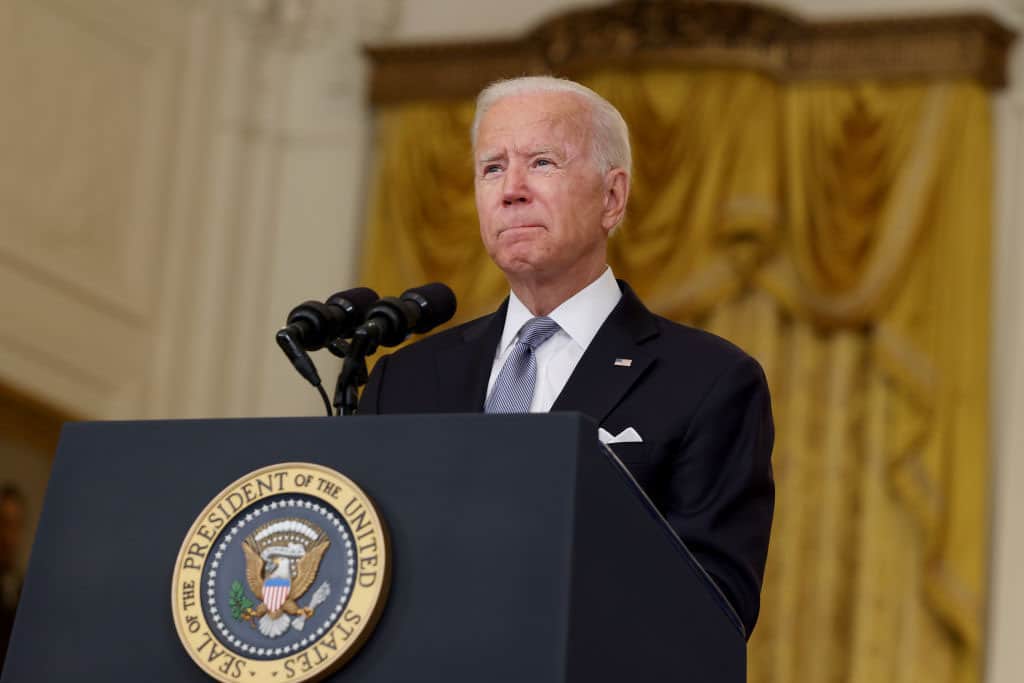 U.S. President Joe Biden giving remarks on the worsening crisis in Afghanistan from the East Room of the White House August 16, 2021 in Washington, DC. (Photo by Anna Moneymaker/Getty Images)
U.S. President Joe Biden giving remarks on the worsening crisis in Afghanistan from the East Room of the White House August 16, 2021 in Washington, DC. (Photo by Anna Moneymaker/Getty Images) President Joe Biden is good at making bold, self-assured statements, regardless of reality. While desperate Afghanis were running after U.S. evacuation planes on the tarmac at Kabul airport, he told Americans he stood “squarely” behind his bungled approach to withdrawing U.S. troops from Afghanistan. And while claiming that “the buck stops with me,” he blamed everyone but himself for the fiasco.
Perhaps he missed that even his own side took him to task.
“The current chaos looks more like an ignominious defeat than an exit with honor,” Stephen Collinson wrote on CNN.com. “[Biden] has portrayed himself as a fixer of American problems. He’s the American president standing up for democracy — and he just left a fragile Afghan democracy in ruins.”
On MSNBC, former CIA analyst Matt Zeller said, “I was appalled. There was such a profound bald-faced lie in [Biden’s] speech, the idea we planned for every contingency?…They didn’t plan for the evacuation of our Afghan war-time allies. They’re trying to conduct it now at the 11th hour.”
In The New York Times, Thomas Friedman excoriated Biden’s team: “Its failure to create a proper security perimeter and transition process, in which Afghans who risked their lives to work with us these past two decades could be assured of a safe removal to America — not to mention an orderly exit for foreign diplomats, human rights activists and aid workers — is appalling and inexplicable.”
It’s rare to see such consensus from across the political spectrum, especially during these rabidly polarized times. But certain stories write themselves. The incompetent execution of the U.S. withdrawal from Afghanistan is one of those.
It’s rare to see such concensus from across the political spectrum, especially during these rabidly polarized times. But certain stories write themselves. The incompetent execution of the U.S. withdrawal from Afghanistan is one of those.
I’ll leave the political commentary and analysis of ramifications to others. I just want to bring up a simpler idea—the value of thinking things through.
Why do I get the feeling that our commander-in-chief doesn’t enjoy thinking things through? He had plenty of warning about the dangers on the horizon. What did he do with that information? As The New York Times reported on Aug. 17, “Classified assessments by American spy agencies over the summer painted an increasingly grim picture of the prospect of a Taliban takeover of Afghanistan and warned of the rapid collapse of the Afghan military, even as President Biden and his advisers said publicly that was unlikely to happen as quickly.”
Biden could have rolled up his sleeves, gathered his team of experts and considered all these intelligence assessments to craft a thoughtful plan. Instead, he seemed to float on the surface, telling the world America was “leaving Afghanistan” and to hell with the pesky details of implementation.
Did the president, for example, ignore the central fact that after his announcement of the withdrawal in April, the U.S. pulled its air support, intelligence and contractors which serviced Afghanistan’s armed forces? How did he expect them to effectively fight the Taliban without that crucial assistance? Did he even consider the option of maintaining a status quo that would be infinitely safer for the world than what we are seeing now?
Regarding his bungled execution, here’s what Leon Panetta, who served as defense secretary under President Barack Obama, said to the Washington Post:
“He didn’t really spend much time on the issue that I think really concerns the American people, which is the execution of that decision… It just struck me that they were crossing their fingers and hoping chaos would not result. And it doesn’t work that way.”
It’s one thing when people argue politics on Twitter without thinking things through. They’re not in charge of our country. We didn’t vote for them.
But when the stakes are so high and the leader of the free world gives every indication of being sloppy and rash, what gives? He’s the last person who should have a short attention span.
The problem of ending the U.S. troop presence in Afghanistan demanded sober, broad and deep discourse, not rash pronouncements.
I hope the Chabad Rabbi who keeps the White House kitchen kosher during Hannukah parties will swing by once a week and give our president a Talmud class. Biden could use some practice in how to dissect, assess and debate the most complicated issues. The problem of reducing the U.S. troop presence in Afghanistan in the smartest, safest way possible was, indeed, complicated. It demanded sober, broad and deep discourse, not rash pronouncements.
Biden is now trying to catch up and bring some order to the chaos. But for the people of Afghanistan who will live under a theocratic regime guided by Sharia law, it’s not much consolation. They are the ones who will pay the highest price for our leader’s sloppiness and empty bluster.























 More news and opinions than at a Shabbat dinner, right in your inbox.
More news and opinions than at a Shabbat dinner, right in your inbox.